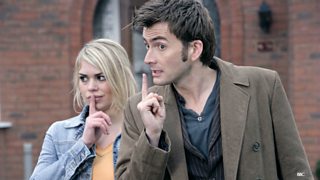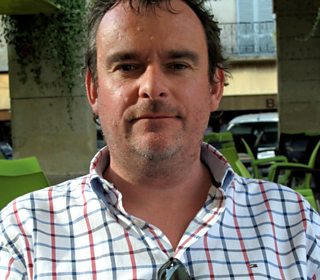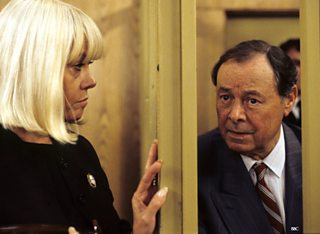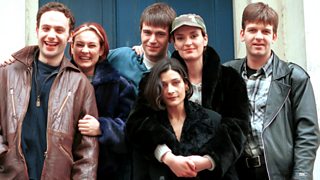Stars of Genome: Matthew Graham
Tagged with:

Matthew Graham says some Doctor Who fans were unimpressed with his episode Fear Her
Matthew Graham may not be a name that's immediately familiar to television viewers. But you're likely to have seen the screenwriter's work in the last few decades.
He has penned episodes of major shows including EastEnders, Doctor Who, Life on Mars and This Life among others. Here he shares some of the inner workings of his craft and stories of some of the actors and major names in television he's worked with over the years. Matthew currently has 110 mentions in the Genome database.
What was your first job in radio or television? My first job was writing an ITV children's show called Streetwise - must have been in 1990. I think I was hired because I was practically a kid myself. It was about cycle couriers in London and it starred an unknown young actor by the name of Andy Serkis. I wonder if he’s still in the business??...
What are your strongest memories from working on the following shows?
EastEnders This was my writing school. I started at 23 and wrote about 35 episodes over five years. It taught me to work quickly and to interweave multiple storylines. It also taught me to understand production and how to write around production problems. For example I once had to tell story with Pat and Frank, where Mike Reid was only available on the Studio days and Pam St Clements was only available for exteriors. So I had them refusing to talk to each other and she would only shout at him through the window of the Queen Vic. It actually made the scenes more dynamic.
Doctor Who A joy. Both under Russell T Davis and Steven Moffat. You have to write with boundless energy and of course with those two leading the way you have to “run” very fast to have any hope of keeping up. Doctor Who is tough in the sense of the exposure and scrutiny that every line of every scene seems to come under from the fans. My first episode was which the older Whovians didn’t much care for. But I was tasked by Russell with writing an episode specifically for the younger ones - and they seemed to enjoy it. Under Steven I got to do a two-parter that was darker. I tried to tap into the vibe of the Patrick Troughton era. I don’t envy the show runners on Doctor Who. It’s wonderful gig but the worldwide attention would drive me nuts!
We thought nobody would watch it. It was this big, indulgent white elephant - our attempt to get away with The Sweeney. It was only after we filmed Episode One that we realised how strong the chemistry was between Sam and Gene and so I beefed up Gene’s role. I remember after the first episode aired, I was in a cafe near my house and I overheard a couple talking. The guy was saying, “And you don’t know if he’s mad or in a coma dream or if he’s fallen back in time …” And I thought, “Hmmm, maybe we’ve got something here that people will get into …"
It was a small, low budget ��������2 show with no real plots as such. Having come straight off EastEnders I wasn’t familiar with drama that didn’t end in a birth, marriage, affair, termination or death! It was initially terrifyingly vague and then very, very liberating. I felt I could just have the characters drinking wine on the sofa and talking about sex and careers and money (or lack of it) - in other words all the things me and my mates were talking about. My boss was Tony Garnett - an amazing producer of course and a man who once he trusted you, just let you write what you wanted. His only note was “keep it real”.

Matthew Graham: 'I really loved writing for David Tennant - he’s an actor who actually inspires you to write in a different way'
What is your experience of ‘giving birth’ to characters and shaping their existences? I usually have to picture an actor in the role to start with. With Life on Mars I pictured John Simm as Sam even though I knew we probably wouldn’t get him! Sometimes though I picture a person I know - a friend, colleague or relative that I think embodies the character. But everything changes at casting when a talented actor reinterprets the role. Often then you start recalibrating for that actor's strengths.
What is it like having such a pivotal role but working out of sight? Mostly I like being out of sight! More and more these days a show creator or show runner is visible. We give more interviews and the public link us more emphatically with the drama. In other words we soak up the praise and get the blame. It teaches you to be robust and I think it can make your writing more strident and more assured.
Which character and storyline of your creations are your favourites? I have to say that Sam and Gene are my favourite creations. The whole arc of Life on Mars and I just loved and am very proud of. But I also wrote an episode of EastEnders many years ago when Sonia gave birth to a baby she didn’t know she was carrying. I tried to make it scary, funny and life-affirming and I think in the most part I pulled it off.

Matthew Graham shaped EastEnders characters including Pauline and Arthur Fowler
Tell us a killer line of dialogue you’ve come up with that you’re most proud of Gene, Life on Mars: (to small children in the street) Anything happens to this motor and I come round your houses and stamp on all your toys. Got it?
Who are the stars and actors have made the biggest impact on you over the years? I always loved writing for Bill Treacher from EastEnders. Arthur Fowler was such a tragic figure and Bill could make the lines vibrate with sadness or with gentle warmth. Of course it was always so much fun to see what Phil Glenister was going to do with the Gene Genie. I really loved writing for David Tennant - he’s an actor who actually inspires you to write in a different way because of the vibrancy and élan he brings to his performance.
Are there any other people working behind the scenes who have made an impression on your career? Tony Jordan was a big inspiration to me in my formative years. Tony was so effortlessly creative and he demystified screenwriting by being so blasé and down to earth about it. He showed me that writing wasn’t the exclusive domain of a certain middle-class quasi-intellectual.
Jane Featherstone (who ran Kudos) was my executive producer on Mars. Jane is so clever at managing talent and driving through an idea. She believes in writers and fights for a vision. Courageous, creative and bloody good fun to be with. Russell T Davies - his boundless love for TV drama is inspirational. He knows his own creative mind so well and I’ve tried to emulate his confidence and self-belief and (like him) still try to not fall into the trap of arrogance and pig-headedness.

Working on cult hit This Life was 'initially terrifyingly vague'
Do you remember the first time your name appeared in the Radio Times? Yes. Episode 779 of EastEnders. By Matthew Graham.
Have you ever searched for yourself in the Genome database? No, but I’m going to now you’ve put the idea in my head!
How important do you think it is to preserve the history of TV and radio listings? It’s the main artery of our popular cultural heritage. It reminds us where we were and who we were as a nation. It’s essentially important.